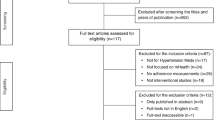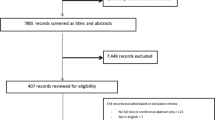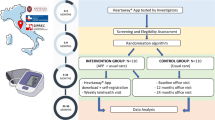Abstract
Purpose of Review
Hypertension and hyperlipidemia represent two major risk factors for atherosclerotic cardiovascular disease. Mobile health or mHealth is defined as the use of mobile phone and wireless technologies to support the achievement of health objectives. Management of hypertension, and to some extent hyperlipidemia, has often employed mHealth interventions given lower cost and greater patient engagement compared to traditional methods. These interventions include the use of text messaging, wireless devices, and mobile phone applications. This review considers recent studies evaluating the effectiveness of mHealth interventions in the management of hypertension and hyperlipidemia.
Recent Findings
Numerous studies have evaluated the role of mHealth interventions in the management of hypertension, while very few have evaluated their role in hyperlipidemia. Text messaging has been used most frequently. However, the trend is shifting towards the use of mobile phone applications and wireless devices. Interventions in developing countries have been modified for greater applicability to local settings. mHealth interventions were found to be frequently effective. However, studies comparing the relative efficacy of various mHealth strategies are scarce. Long-term cardiovascular outcomes data and analyses relating to cost effectiveness are also lacking.
Summary
mHealth interventions may be effective in improving hypertension management. More studies are needed to evaluate the role of mHealth strategies in hyperlipidemia management, particularly in identifying high-risk individuals and improving medication adherence. Studies assessing the long-term impact of these interventions, comparing different interventions and analyzing their relative cost effectiveness, are also needed. Following recently published guidelines on reporting results of mHealth interventions will provide a more meaningful context for interpreting these promising early studies.
Similar content being viewed by others
References
Papers of particular interest, published recently, have been highlighted as: • Of importance •• Of major importance
World Health Organization. Global status report on noncommunicable diseases. 2014.
Huffman MD, Capewell S, Ning H, Shay CM, Ford ES, Lloyd-Jones DM. Cardiovascular health behavior and health factor changes (1988–2008) and projections to 2020: results from the National Health and Nutrition Examination Surveys. Circulation. 2012;125(21):2595–602.
Writing Group Members, Mozaffarian D, Benjamin EJ, Go AS, Arnett DK, Blaha MJ, et al. Executive summary: heart disease and stroke statistics—2016 update: a report from the American Heart Association. Circulation. 2016;133(4):447–54.
Lloyd-Jones DM, Hong Y, Labarthe D, Mozaffarian D, Appel LJ, Van Horn L, et al. Defining and setting national goals for cardiovascular health promotion and disease reduction: the American Heart Association’s strategic Impact Goal through 2020 and beyond. Circulation. 2010;121(4):586–613.
World Health Organization. mHealth new horizons for health through mobile technologies. Global Observatory for eHealth series - Volume 3.
Watson AJ, Singh K, Myint-U K, Grant RW, Jethwani K, Murachver E, et al. Evaluating a web-based self-management program for employees with hypertension and prehypertension: a randomized clinical trial. Am Heart J. 2012;164(4):625–31.
Thiboutot J, Sciamanna CN, Falkner B, Kephart DK, Stuckey HL, Adelman AM, et al. Effects of a web-based patient activation intervention to overcome clinical inertia on blood pressure control: cluster randomized controlled trial. J Med Internet Res. 2013;15(9):e158.
Nolan RP, Liu S, Shoemaker JK, Hachinski V, Lynn H, Mikulis DJ, et al. Therapeutic benefit of internet-based lifestyle counselling for hypertension. Can J Cardiol. 2012;28(3):390–6.
Cicolini G, Simonetti V, Comparcini D, Celiberti I, Di Nicola M, Capasso LM, et al. Efficacy of a nurse-led email reminder program for cardiovascular prevention risk reduction in hypertensive patients: a randomized controlled trial. Int J Nurs Stud. 2014;51(6):833–43.
Magid DJ, Olson KL, Billups SJ, Wagner NM, Lyons EE, Kroner BA. A pharmacist-led, American Heart Association Heart360 web-enabled home blood pressure monitoring program. Circ Cardiovasc Qual Outcomes. 2013;6(2):157–63.
Piette JD, Datwani H, Gaudioso S, Foster SM, Westphal J, Perry W, et al. Hypertension management using mobile technology and home blood pressure monitoring: results of a randomized trial in two low/middle-income countries. Telemed J E Health. 2012;18(8):613–20.
Kiselev AR, Gridnev VI, Shvartz VA, Posnenkova OM, Dovgalevsky PY. Active ambulatory care management supported by short message services and mobile phone technology in patients with arterial hypertension. J Am Soc Hypertens. 2012;6(5):346–55.
Hacking D, Haricharan HJ, Brittain K, Lau YK, Cassidy T, Heap M. Hypertension health promotion via text messaging at a Community Health Center in South Africa: a mixed methods study. JMIR Mhealth Uhealth. 2016;4(1):e22.
Davidson TM, McGillicuddy J, Mueller M, Brunner-Jackson B, Favella A, Anderson A, et al. Evaluation of an mHealth Medication Regimen Self-Management Program for African American and Hispanic Uncontrolled Hypertensives. J Pers Med. 2015;5(4):389–405.
• Logan AG, Irvine MJ, McIsaac WJ, Tisler A, Rossos PG, Easty A, et al. Effect of home blood pressure telemonitoring with self-care support on uncontrolled systolic hypertension in diabetics. Hypertension. 2012;60(1):51–7. The study tested a home BP telemonitoring system that provided self-care messages on the smartphone of patients immediately after each reading—perhaps a way for the future.
Kim JY, Wineinger NE, Steinhubl SR. The influence of wireless self-monitoring program on the relationship between patient activation and health behaviors, medication adherence, and blood pressure levels in hypertensive patients: a substudy of a randomized controlled trial. J Med Internet Res. 2016;18(6):e116.
Wijsman LW, Richard E, Cachucho R, de Craen AJ, Jongstra S, Mooijaart SP. Evaluation of the use of home blood pressure measurement using mobile phone-assisted technology: the iVitality proof-of-principle study. JMIR Mhealth Uhealth. 2016;4(2):e67.
World Health Organization. Global status report on noncommunicable diseases. 2010.
Nwankwo T, Yoon SS, Burt V, Gu Q. Hypertension among adults in the United States: National Health and Nutrition Examination Survey, 2011–2012. NCHS Data Brief. 2013;133:1–8.
Rubinstein AL, Irazola VE, Poggio R, Bazzano L, Calandrelli M, Lanas Zanetti FT, et al. Detection and follow-up of cardiovascular disease and risk factors in the Southern Cone of Latin America: the CESCAS I study. BMJ Open. 2011;1(1). doi:10.1136/bmjopen-2011-000126.
Mozaffarian D, Benjamin EJ, Go AS, Arnett DK, Blaha MJ, Cushman M, et al. Heart disease and stroke statistics—2015 update: a report from the American Heart Association. Circulation. 2015;131(4):e29–322.
Dekkers JC, van Wier MF, Ariens GA, Hendriksen IJ, Pronk NP, Smid T, et al. Comparative effectiveness of lifestyle interventions on cardiovascular risk factors among a Dutch overweight working population: a randomized controlled trial. BMC Public Health. 2011;11(1):49. doi:10.1186/1471-2458-11-49.
• Chow CK, Redfern J, Hillis GS, Thakkar J, Santo K, Hackett ML, et al. Effect of lifestyle-focused text messaging on risk factor modification in patients with coronary heart disease: a randomized clinical trial. JAMA. 2015;314(12):1255–63. This study from more than 700 participants from Australia tested the effect of using SMS to reduce multiple cardiac risk factors.
Kamal AK, Shaikh Q, Pasha O, Azam I, Islam M, Memon AA, et al. A randomized controlled behavioral intervention trial to improve medication adherence in adult stroke patients with prescription tailored Short Messaging Service (SMS)-SMS4Stroke study. BMC Neurol. 2015;15:212. doi:10.1186/s12883-015-0471-5.
Kamal AK, Muqeet A, Farhat K, Khalid W, Jamil A, Gowani A, et al. Using a tailored health information technology-driven intervention to improve health literacy and medication adherence in a Pakistani population with vascular disease (Talking Rx)—study protocol for a randomized controlled trial. Trials. 2016;17(1):121. doi:10.1186/s13063-016-1244-1.
Ford ES, Capewell S. Trends in total and low-density lipoprotein cholesterol among U.S. adults: contributions of changes in dietary fat intake and use of cholesterol-lowering medications. PLoS One. 2013;8(5):e65228.
Kang H, Park HA. A mobile app for hypertension management based on clinical practice guidelines: development and deployment. JMIR Mhealth Uhealth. 2016;4(1):e12.
Quilici J, Fugon L, Beguin S, Morange PE, Bonnet JL, Alessi MC, et al. Effect of motivational mobile phone short message service on aspirin adherence after coronary stenting for acute coronary syndrome. Int J Cardiol. 2013;168(1):568–9.
Park LG, Howie-Esquivel J, Chung ML, Dracup K. A text messaging intervention to promote medication adherence for patients with coronary heart disease: a randomized controlled trial. Patient Educ Couns. 2014;94(2):261–8.
Vollmer WM, Owen-Smith AA, Tom JO, Laws R, Ditmer DG, Smith DH, et al. Improving adherence to cardiovascular disease medications with information technology. Am J Manag Care. 2014;20(11 Spec No. 17):SP502–10.
Wald DS, Bestwick JP, Raiman L, Brendell R, Wald NJ. Randomised trial of text messaging on adherence to cardiovascular preventive treatment (INTERACT trial). PLoS One. 2014;9(12):e114268.
Gandapur Y, Kianoush S, Kelli HM, Misra S, Urrea B, Blaha MJ, et al. The role of mHealth for improving medication adherence in patients with cardiovascular disease: a systematic review. Eur Heart J Qual Care Clin Outcomes. 2016;2:237–44.
•• Agarwal S, LeFevre AE, Lee J, L’Engle K, Mehl G, Sinha C, et al. Guidelines for reporting of health interventions using mobile phones: mobile health (mHealth) evidence reporting and assessment (mERA) checklist. BMJ. 2016;352:i1174. Recently published guidelines for reporting studies related to mHealth.
Author information
Authors and Affiliations
Corresponding author
Ethics declarations
Conflict of Interest
Hasan Rehman, Ayeesha K. Kamal, Saleem Sayani, and Anwar T. Merchant declare that they have no conflicts of interest.
Pamela B. Morris declares being on the advisory boards for Amgen, AstraZeneca, and Sanofi Regeneron.
Salim Virani declares being an Associate Editor for Innovations, ACC.org.
Human and Animal Rights and Informed Consent
This article does not contain any studies with human or animal subjects performed by any of the authors.
Additional information
This article is part of the Topical Collection on Coronary Heart Disease
Rights and permissions
About this article
Cite this article
Rehman, H., Kamal, A.K., Morris, P.B. et al. Mobile Health (mHealth) Technology for the Management of Hypertension and Hyperlipidemia: Slow Start but Loads of Potential. Curr Atheroscler Rep 19, 12 (2017). https://doi.org/10.1007/s11883-017-0649-y
Published:
DOI: https://doi.org/10.1007/s11883-017-0649-y




